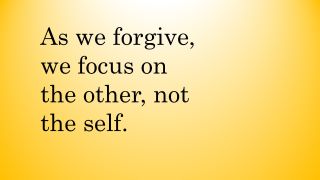Forgiveness
The 3 Paradoxes of Forgiveness That Confuse Many People
Forgiveness can seem scary in that it focuses on those who have harmed us.
Posted January 4, 2023 Reviewed by Davia Sills
Key points
- A paradox is an apparent contradiction that actually is not a contradiction.
- The forgiveness process has embedded within it three paradoxes.
- Addressing these concerns can ease people's hesitancy to forgive and open the door to emotional healing.

Sometimes forgiving those who hurt us does not make sense. People tend to ask, “Why should I reach out to someone who deeply hurt me? Why not just move on with life?” This question tends to arise because the one who is contemplating forgiveness does not seem to understand what I call the paradoxes of forgiveness. A paradox is an apparent contradiction that is not a contradiction at all.
I think forgiveness may be difficult to understand and may lead somewhat easily to the above question because, as a moral virtue, it is not centered on justice or finding a fair solution to our problems. Instead, forgiveness is centered on the moral virtues of mercy and love or giving to others above and beyond what is deserved. When we forgive, we are not asking for fairness, nor are we neglecting justice. Forgiveness and justice can and do exist side by side.
Yet, when we look at forgiveness by itself, it has three areas of paradox that can confuse people. Let us take each one in turn and show how these qualities of forgiveness are reasonable if not always well understood.
Paradox 1: When I am in pain, shouldn’t I focus on myself and not those who abuse me?
When we forgive, we focus primarily on the one who hurt us and not on ourselves. This seems not to make sense because when we are hurting physically, the focus is always on ourselves. For example, if you sprain your ankle while running, the doctor focuses on you, on your ankle, and not on other people.
Yet, in forgiving, we shine the light on the ones who hurt us. We do this so that we can better understand them. We try to see the history of those who acted unfairly toward us. Who hurt these people so badly that they now victimize others, including us? We try to see their humanity and the common humanity that we share with them. The point of focusing on those who hurt us, rather than on our own broken hearts, is to expand our story of them so that, over time, we might be able to develop some compassion, a softer heart, toward them.

Paradox 2: If I bear the pain for the other, this is unfair, and my pain may remain.
The second paradox emerges from the first. If one of our important tasks in forgiving is to expand our story of who our offenders are and to do no harm toward them, then part of forgiving is to bear the pain of what happened as we refrain from revenge. The paradox here is this: Why should I now be asked to bear the pain for those who dumped the truck of pain onto me? Not only does this seem unfair, but it also seems ill-advised from a mental health standpoint. After all, the task should be to eliminate pain, not bear it.
Yes, bearing the pain does seem unfair, but we must realize, again, that forgiveness is not part of fairness or justice but instead part of mercy. When we have mercy, we give people more than they deserve. From the mental health standpoint, what we find when people deliberately make a commitment to bear the pain and then follow through on this commitment is this: The pain actually begins to slowly lift.
At times in therapy, we use the image of a sponge soaked with water. That sponge is so saturated that it seems that the water will never leave. Yet, as we place the sponge, filled with water, on the counter, the water slowly evaporates, leaving the sponge dry. As people bear the pain, that pain slowly lifts. Further, as people bear this pain, they realize that they are standing up to the pain and it is not destroying them. The result is that the forgiver begins to form a more positive view of the self: I am stronger than I thought I was.

Paradox 3: If I focus on the other and bear the pain, I may never heal psychologically.
The third paradox of forgiveness is this concern that if I focus on the other and bear the pain, it will leave me stuck with anger and confusion. I am stuck with a negative version of who I am as a person. After all, how valuable am I to others and myself when I am carrying around a large sack of discontent all the time? Therefore, I will not heal in a psychological sense.
Yet, our research shows, over and over, that as people engage in the process of forgiveness, it is them—the forgivers—who experience considerable psychological healing, such as reduced anger, anxiety, and depression, and increased self-esteem and hope for the future. See, for example, Freedman and Enright (1996), Reed and Enright (2006), and Yu et al. (2021).
In summary
A quick look at forgiveness can lead to hesitancy about trying it and distortions in thinking about what forgiveness is and is not. Yet a careful look at forgiveness shows that much of the hesitancy and criticism of forgiveness lies within the paradoxes that are not yet carefully examined. As we look at the paradoxes, we see that as we focus the light on the one who offended, as we bear the pain for this person, we, the forgivers, are the ones who experience considerable psychological healing that is empirically verified. Examining these paradoxes might ease the hesitancy in some people and open the door to this emotional healing.
References
Freedman, S. R., & Enright, R. D. (1996). Forgiveness as an intervention goal with incest survivors. Journal of Consulting and Clinical Psychology, 64(5), 983-992.
Reed, G. & Enright, R.D. (2006). The effects of forgiveness therapy on depression, anxiety, and post-traumatic stress for women after spousal emotional abuse. Journal of Consulting and Clinical Psychology, 74, 920-929.
Yu, L., Gambaro, M., Song, J., Teslik, M., Song, M., Komoski, M.C., Wollner, B., & Enright, R.D. (2021). Forgiveness therapy in a maximum-security correctional institution: A randomized clinical trial. Clinical Psychology and Psychotherapy.https://doi.org/10.1002/cpp.2583




